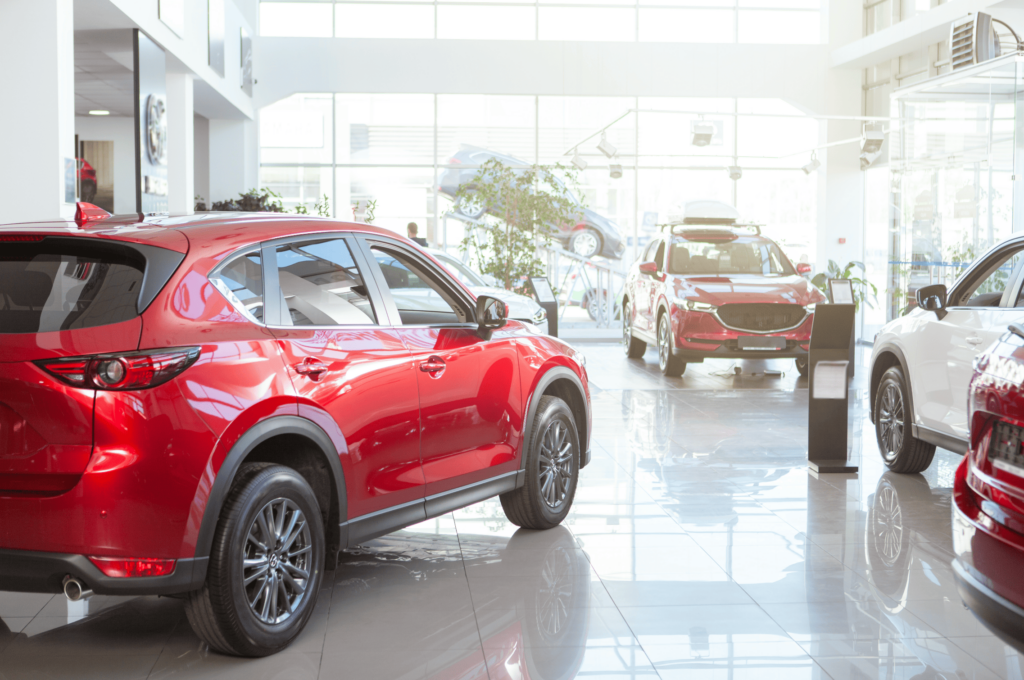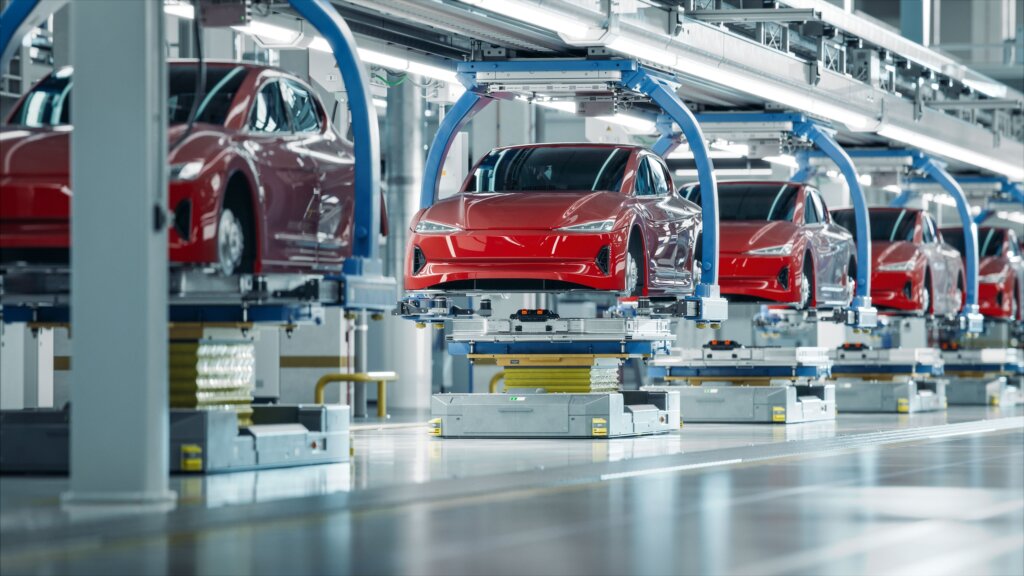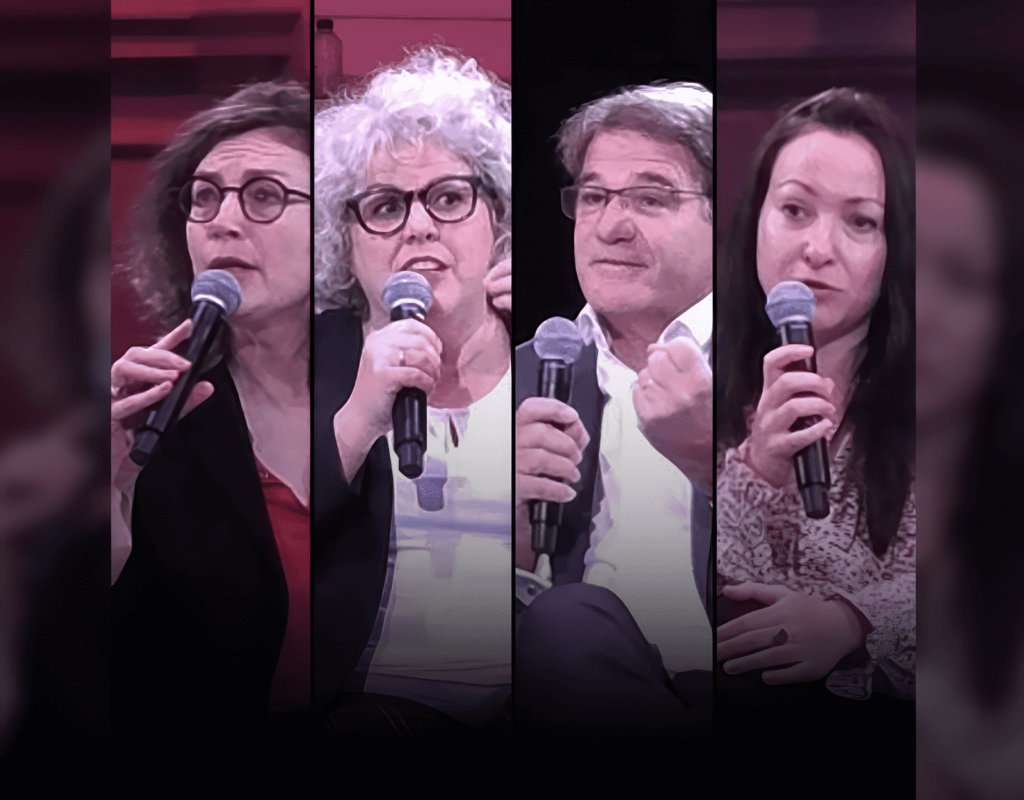Harsh Political Winds Chill North American Electric Vehicle Industry
With President Donald Trump’s 25% tariff threats against auto imports from Canada and Mexico on hold until the end of February, and China hit with Trump tariffs at a lower 10% rate, U.S. automakers are breathing a small sigh of relief. But Trump could still impose tariffs, raising prices for U.S. electric vehicle buyers and erecting barriers to EV sales.

Kurt Kelty is a battery expert who calculates everything, even the carbon footprint of the blueberries he buys, he confesses on the website of his employer, the U.S. automaker General Motors. At a February 2025 celebration of his first anniversary leading the GM battery and propulsion teams, Kelty said now he aims to lower GM’s carbon footprint.
Kelty landed at GM a year ago after more than 30 years in the industry, including 11 years at Tesla, where he was senior director of battery technology, delivering the batteries in the Roadster, Model S/X and Model 3, and leading partnerships and material sourcing at the Gigafactory. Earlier, Kelty was director of business development at Panasonic, where he founded the U.S. battery R&D lab.
Kelty has just added sustainability to his job portfolio. “I’m looking forward to diving deeper into our emissions reduction strategy,” he explained this week.
Despite the tariff shakeup President Donald Trump has put the U.S. auto industry through since he took office on January 20, Kelty, shown in photo to the right, believes the American EV industry is here to stay, and to prosper.
“In 2024, more than 1.3 million Americans bought new EVs, unlocking technological benefits like instantaneous torque, smoother and quieter drives, and convenient home charging,” Kelty wrote on the GM website.
“GM was among the fastest growing EV manufacturers, thanks to a big bet made years ago: a scalable battery and electrification platform that now underpins almost a dozen different GM products across our brands, from the affordable Chevrolet Equinox EV with a starting MSRP of $33,600, to the workhorse GMC Sierra EV Denali with a GM-estimated range of up to 460 miles, to the luxurious Cadillac Escalade IQ,” Kelty wrote on February 5, 2025.
GM and LG, a South Korean company, already produce batteries jointly at giant factories in Warren, Ohio and Spring Hill, Tennessee, for vehicles like the Cadillac Lyriq and Chevrolet Equinox. GM has a separate battery joint venture with Samsung SDI that is building a factory in New Carlisle, Indiana.
With Trump’s 25% tariff threats against auto imports from Canada and Mexico on hold until the end of February, and only China hit with Trump tariffs at a lower rate of 10%, U.S. automakers are breathing a small sigh of relief. But Trump could still impose tariffs if Canada and Mexico fail to cooperate with his agenda, a threat that could raise prices for U.S. electric vehicle buyers and raise barriers to electric vehicle sales.
But Kelty predicts that battery prices are about to fall, lowering EV prices across the board.
“SIGNIFICANT REDUCTIONS IN EV BATTERY COSTS ARE WITHIN REACH, DRIVEN BY INNOVATIONS IN PRODUCTION PROCESSES AND MATERIAL SCIENCE. IN FACT, WE EXPECT TO REDUCE OUR COMBINED BATTERY CELL AND PACK COSTS BY $30 PER KILOWATT HOUR IN 2025. AS AN INDUSTRY, BATTERY PRICES DECLINED IN 2024 GLOBALLY AND ARE EXPECTED TO CONTINUE TO COME DOWN AS MANY MANUFACTURING INVESTMENTS LAUNCH IN VOLUME ACROSS NORTH AMERICA.” – Kurt Kelty, Vice President, Batteries, Propulsion, and Sustainability, General Motors
Trump’s tariff actions have raised the hackles of the United Auto Workers Union (UAW) members, nearly half of whom voted for Trump in 2024.
Trump’s victory in the 2024 election dealt a blow to UAW President Shawn Fain’s efforts to rebuild the union’s political influence. Despite an aggressive campaign to support Democrat Vice President Kamala Harris, the union’s influence fell short among its members, who were divided in their political leanings. NBC exit polls reported approximately 44% of UAW members voted for Trump.
“The UAW supports aggressive tariff action to protect American manufacturing jobs as a good first step to undoing decades of anti-worker trade policy,” the union says on its website. “We do not support using factory workers as pawns in a fight over immigration or drug policy.”
“We are willing to support the Trump Administration’s use of tariffs to stop plant closures and curb the power of corporations that pit U.S. workers against workers in other countries. But so far, Trump’s anti-worker policy at home, including dissolving collective bargaining agreements and gutting the National Labor Relations Board, leaves American workers facing worsening wages and working conditions even while the administration takes aggressive tariff action,” the UAW stated.
The union asked on February 3 that the Trump Administration renegotiate “broken trade deals” among the U.S., Canada and Mexico. In his first term (2017-2021) President Trump replaced the North American Free Trade Agreement (NAFTA) among the three countries with the United States-Mexico-Canada Agreement (USMCA), which took effect on July 1, 2020.
“The national emergency we face is not about drugs or immigration, but about a working class that has fallen behind for generations while corporate America exploits workers abroad and consumers at home for massive Wall Street paydays. We need to stop plant closures, bring back American jobs, and stop the global race to the bottom immediately,” the UAW stated. “Any tariff action must be followed with a renegotiation of the USMCA, and a full review of the corporate trade regime that has devastated the American and global working class.”
Nor is the environmental community in favor of tariffs. The environmental nonprofit Sierra Club says, “Tariffs should be a scalpel, not a sledgehammer.”
“Donald Trump is again making the wrong move that puts even more pain on American families. The United States is demonstrating clean, billion-dollar, cutting-edge technologies to make aluminum and steel more efficiently, while some of our fiercest global competitors double down on pollution,” Sierra Club Executive Director Ben Jealous said this week.
“Trump’s expensive trade war will hurt American workers and consumers by driving up costs to make clean American steel, aluminum, vehicles, and energy products. Instead of demanding that Americans pay more, Trump should support the policies that will grow domestic manufacturing, reduce costs, and help working families,” Jealous said.
For decades, automakers have built cross-border supply chains linking the United States, Mexico and Canada. More than one in five of the cars and light trucks sold in the United States were built in Canada or Mexico, according to a recent report from S&P Global Mobility.
In 2023, the United States imported US$69 billion worth of cars and light trucks from Mexico, more than any other country, and $37 billion from Canada. Another $78 billion in auto parts came from Mexico and $20 billion from Canada. The engines in Ford F-series pickups and the iconic Mustang sports coupe, for instance, come from Canada.
While S&P Global Mobility noted that January auto sales began the year 2025 on positive note, January sales were expected to slow from the uptake realized in December but still sustain some of 2024’s fourth-quarter progress.
“Auto sales are expected to post a decent volume level in January,” said Chris Hopson, principal analyst at S&P Global Mobility. “An uncertain auto demand environment awaits in 2025, as the industry and consumers digest potential policy changes from the new administration, but together with the inventory draw down at the end of 2024, and weather impacts during the month, January sales should be viewed as a positive result.”
In Washington, DC, the right-leaning libertarian Cato Institute warned, “These new US import taxes, as well as retaliation against US businesses that the Canadian and Mexican governments have promised, would cause significant damage to the US, Canadian, and Mexican economies.”
“YOU HAVE ENGINES AND CAR SEATS AND OTHER THINGS THAT CROSS THE BORDER MULTIPLE TIMES BEFORE GOING INTO A FINISHED VEHICLE. YOU HAVE AMERICAN PARTS GOING TO MEXICO TO BE PUT INTO VEHICLES THAT ARE THEN SHIPPED BACK TO THE UNITED STATES. YOU THROW 25% TARIFFS INTO ALL THAT, AND IT’S JUST A GRENADE.” – Scott Linciome, Vice President, General Economics, Cato Institute.
S&P Global Mobility cautioned that, “Importers are likely to pass most, if not all, of this [cost] increase to consumers.”
From the Canada-based Toronto Dominion Bank, TD Economics notes that average U.S. car prices could rise by around $3,000 at a time when the average new car already goes for $50,000 and the average used car for $26,000, according to Kelley Blue Book.
Under the Biden Administration, drivers favored Ford’s electrified vehicles in 2024, supporting growth and setting record sales for the year. With 285,291 electrified vehicles sold, sales were up 38% in 2024 over the previous year, exceeding the sales of GM and Stellantis.
Ford’s Power Promise, a program which includes a complimentary home charger with standard installation at no extra charge and access to a 24/7 Ford advisor for electric vehicle support, helped boost Ford electric vehicle sales in Q4 to a new best-ever electric vehicle sales record with 30,176 electric vehicles sold.
With the success of the program, Ford is extending the Ford Power Promise complimentary home charger and standard installation into the new year to build on the momentum of record sales growth.
In 2024, each of Ford’s electric vehicles set new sales records. For the quarter, Mustang Mach-E posted its best-ever quarterly sales result with 16,119 vehicles sold, making it America’s best-selling electric SUV behind only Tesla’s Model Y in 2024.
Tesla Sales Fall While Global EV Vehicle Sales Tick Upward
Tesla’s dramatic drop in sales is part of the same story, with the addition of the extensive involvement of unelected Tesla co-founder and CEO Elon Musk in the politics of the second Trump administration.
Until 2022, Musk predicted that Tesla’s sales would surge to 20 million units by the end of the decade. But with Tesla’s global sales shrinking 1% in 2024 to 1.79 million units and U.S. sales dropping more than 5.6%, he’s not trumpeting that now.
The California New Car Dealers Association (CNCDA) has released its Q4 2024 report showing that Tesla experienced its first annual drop in sales – by double digits in California, the most important EV market in the United States, while the rest of the EV market is growing.
CNCDA commented on Tesla’s performance, saying, “Things aren’t looking so golden for EV automaker Tesla in the Golden State. Tesla’s dominance in the electric vehicle market continues to falter as the brand reported its fifth consecutive quarterly registration decline. Tesla’s registrations fell 7.8 percent in Q4 2024, contributing to an overall 11.6 percent decline in 2024. The company’s market share also dropped by 7.6 points in 2024, now holding 52.5 percent of the Zero Emission Vehicle market for the year. Amongst all brands, Tesla’s share of California’s market is 11.6 percent, down from 13 percent in 2023.”
By comparison, the overall EV segment grew 7.4% during the first eight months of 2024. Pull out Tesla, and demand for other EV brands grew 12.2%. “Tesla alone has been a major factor in the overall slowdown of the U.S. EV market,”
With so many more “compelling products” to pick from brands ranging from Audi to Volvo, it’s not a surprise the competition is gaining share and building sales, Ed Kim, CEO of the research firm AutoPacific, Inc. told Headlight News. “Tesla sales have absolutely cratered this year,” Kim said.
And it’s happening in Europe too. Tesla registrations for the month plunged 63% in France, 44% in Sweden, 38% in Norway, and 42% in the Netherlands. The decline was a more modest 12% in the UK, but the EV maker fell from second on the EV sales list to seventh, according to data published by New AutoMotive, an independent transport research group based in the UK.
In Washington, DC, Musk, the world’s wealthiest man, has been busy. Now named as a “special government employee” and head of the new so-called Department of Government Efficiency (DOGE), Musk is pushing to deconstruct the federal bureaucracy, triggering questions about the scope of his authority and warnings of a constitutional crisis, or even a coup.
As the CEO of Tesla and SpaceX, Musk has billions of dollars in government contracts, a fact that has raised concerns about conflicts of interest woven into his cost-cutting drive.
Musk does not hold elected office and is not part of Trump’s Cabinet, whose members require confirmation by the U.S. Senate.
During the first three weeks of Trump’s second term, acting without Congressional oversight, Musk’s cadre of young techs have brought the work of the United States main foreign aid agency, USAID, to a halt, earmarked millions of government employees for redundancy, gained access to classified material and sensitive details about millions of Americans, and taken control of the payment system that manages the flow of trillions of dollars of government spending.
All these activities appear to be linked to Tesla’s declining sales.
“I was heavily considering getting a Tesla when my lease was up because I do like having an electric around-town vehicle,” said Erica S, a media expert from Scottsdale, Arizona who asked that her last name not be used. “But Musk is so crazy pants that I just can’t even consider buying one,” she told Headlight News.
Another driver posted, “Elon Musk has made buying a Tesla about him. He’s a lunatic. Hence, I’m not buying one.”
A potential Tesla customer posted on the electrek website, “Elon, there’s a small rural hardware store owner who has a bit of advice for you. He said, ‘Politics is bad for business. No matter what stance you take on any issue, you will lose at least half of your customers. I don’t want to lose any of my customers!’ Pure genius! Elon, take note. Look at what happened since you started partying with trump. Yup, politics is definitely bad for your business.”
Many other social media posts project a similar message, a new feeling amongst the driving public that could set EV adoption back.
“Our economies are inextricably linked by manufacturing and many other critical industries,” Glenn Stevens Jr., executive director of the automotive industry association MichAuto, said in a statement this week. “MichAuto and its constituents are concerned about the collateral damage that will be done to manufacturing, the impact it will have on Michiganders’ jobs, and the fact that the consumer will feel the increased cost of doing business in the prices they pay from vehicles in the showrooms to the grocery store.”
The grocery store, where Kurt Kelty is busy in the produce section counting up the carbon footprint of the blueberries he will eat for breakfast and planning a smaller carbon footprint for General Motors.
Toute l’actualité de Movin’On
dans votre boîte mail
Auteur
Partager
Tweets de @movinonconnect
Movin'On 2035 TODAY EP02 - Circular Economy & Competitivity
Movin’On 2035 TODAY EP01 – Fair Mobility for All https://x.com/i/broadcasts/1yNxagBrWZbGj
✨ THAT'S A WRAP!
Movin'On Summit 2024 has just concluded in Brussels!
More than 350 leaders and experts in sustainable mobility gathered to exchange ideas, collaborate, and share their vision for desirable and decarbonised mobility in Europe. Together, we explored ways to build…
🔴 Live from #MovinOnSummit2024
@AshaSumputh has just invited Denis Machuel, CEO at @AdeccoGroup and Florent Menegaux, President of the @Michelin Group & President of Movin'On
L’actualité de la mobilité durable
Découvrez les dernières tendances, des analyses thématiques et nos prochains rendez-vous





